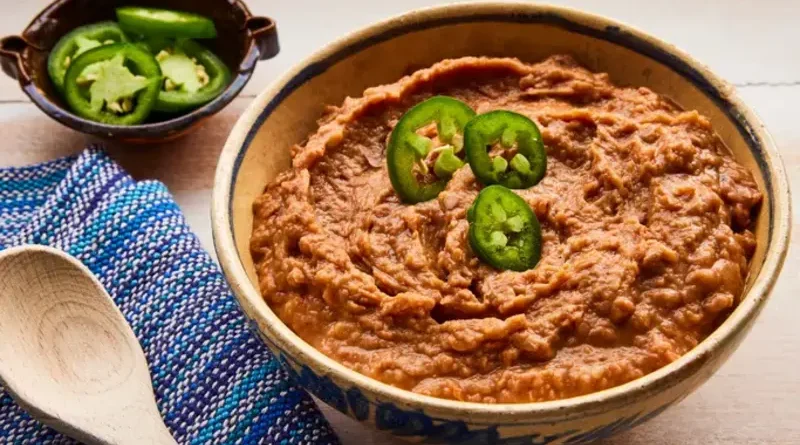Are Refried Beans Healthy? Discover Their Surprising Benefits
Renowned for their rich flavor and adaptability, refried beans are a mainstay in many culinary traditions. But amid the talk about diet and health, one issue comes up: Are refried beans healthy? In this piece, we examine the nutritional makeup of refried beans, consider both their possible advantages and disadvantages from a health standpoint, and offer guidance on how to incorporate them into your diet. Knowing the truth about refried beans is crucial, regardless of whether you enjoy authentic Mexican food or are just looking for wholesome dinner options. Together, let’s discover the truth.
Nutritional Content of Healthy Refried Beans
| Nutrition | Facts |
|---|---|
| Calories | 234 |
| Protein | 13 grams |
| Fat | 5 grams |
| Carbs | 35 grams |
| Fiber | 10 grams |
| Iron | 20% of the Daily Value |
| Magnesium | 22% of the Daily Value |
| Sodium | 64% of the Daily Value |
| Zinc | 14% of the Daily Value |
Health Benefits of Refried Beans
Refried beans are a great complement to a balanced diet because they have several health advantages. Let’s examine a few of the main benefits:
Heart Health:
Refried beans’ low fat and high fiber content are beneficial to heart health. By attaching to and eliminating cholesterol from the body while it is in the digestive system, dietary fiber helps reduce cholesterol levels.
Furthermore, refried beans’ lack of saturated fats lowers the chance of plaque accumulation in the arteries, which lowers the risk of heart disease.
Digestive Health:
Foods high in fiber, such as refried beans, assist regular bowel movements and guard against constipation, which improves digestive health. In addition to providing nourishment for good gut flora, the soluble fiber in beans supports a balanced microbiome.
Blood Sugar Control:
Refried beans include complex carbs that break down slowly and deliver glucose into the system gradually. Refried beans are a good option for people with diabetes or those trying to control their blood sugar levels because of their gradual release, which helps to regulate blood sugar levels.
Weight Management:
Refried beans can aid in promoting satiety and lowering total calorie consumption because of their high fiber and protein content. Being satisfied for extended periods may help with weight management by reducing overeating.
Potential Drawbacks of Refried Beans
Although refried beans provide several health advantages, it’s vital to be aware of any potential disadvantages:
High Sodium Content:
A lot of refried beans that are prepared commercially have extra salt added, which can lead to high blood pressure and other health problems. To cut back on salt, use low-sodium options or create your fresh refried beans.
Flatulence and Digestive Discomfort:
Oligosaccharides, which are found in beans, can make some people bloated and produce gas. Digestion discomfort can be lessened by soaking dried beans before cooking them and by progressively consuming more beans.
Caloric Content in Restaurant Preparations:
Refried beans from restaurants could have extra fat added to them, which would raise their calorie count. To cut down on extra calories, go for prepared meals or healthier selections from restaurants.
Potential Allergen:
Although it is uncommon, some people may have allergies to legumes, especially beans. Refried beans should not be consumed by those who are allergic to beans to avoid allergic reactions.
Impact on Blood Sugar Levels:
Refried beans have a low glycemic index, but they still include carbs in Refried beans, which can raise or lower blood sugar levels. Diabetes sufferers should watch what they eat and adjust their portion sizes accordingly.
You can also watch the video to learn more about this.
Incorporating Healthy Refried Beans into a Balanced Diet
Refried beans are a great complement to a balanced diet because of their adaptability and nutritional value. The following are a few easy ways to include refried beans in your meals:
Tacos and Burritos:
Refried beans make a delicious filler for burritos and tacos. For a tasty supper, pair it with veggies, protein, and toppings.
Dips and Spreads:
Make a tasty spread or dip with beans for munching. Serve as a filling snack or appetizer with bread, healthy crackers, or veggies.
Salad Toppings:
To add taste and protein to salads, top them with refried beans. Mix with your preferred veggies and sauces for a wholesome dinner.
Soups and Stews:
Refried beans can be used in soups and stews to thicken them up. To enhance richness and texture, stir in.
Breakfast Burritos:
Enjoy a substantial breakfast burrito loaded with cheese, refried beans, and scrambled eggs to start your day. For a quick, high-protein lunch, wrap in a tortilla.
Conclusion
Numerous nutritional advantages of refried beans include their high fiber and protein content as well as their vital vitamins and minerals. They support blood sugar regulation, cardiac and intestinal health, and weight management initiatives. But, it’s important to be aware of possible disadvantages including increased sodium content and pain in the digestive system for some people.
You may appreciate the tasty diversity of refried beans and gain their health benefits by adding them to a balanced diet and making informed choices, such as choosing low-sodium types or homemade preparations. Refried beans can be a tasty and useful addition to your culinary repertoire, regardless of whether you enjoy Mexican food or are just looking for wholesome dinner options.
You Can Read More About Beans
Are Black Beans Healthy? Discover the Health Secrets
Unlock Your Health Potential with Delicious High Protein Beans
The Ultimate Guide to the Nutrition of Canned Green Beans
